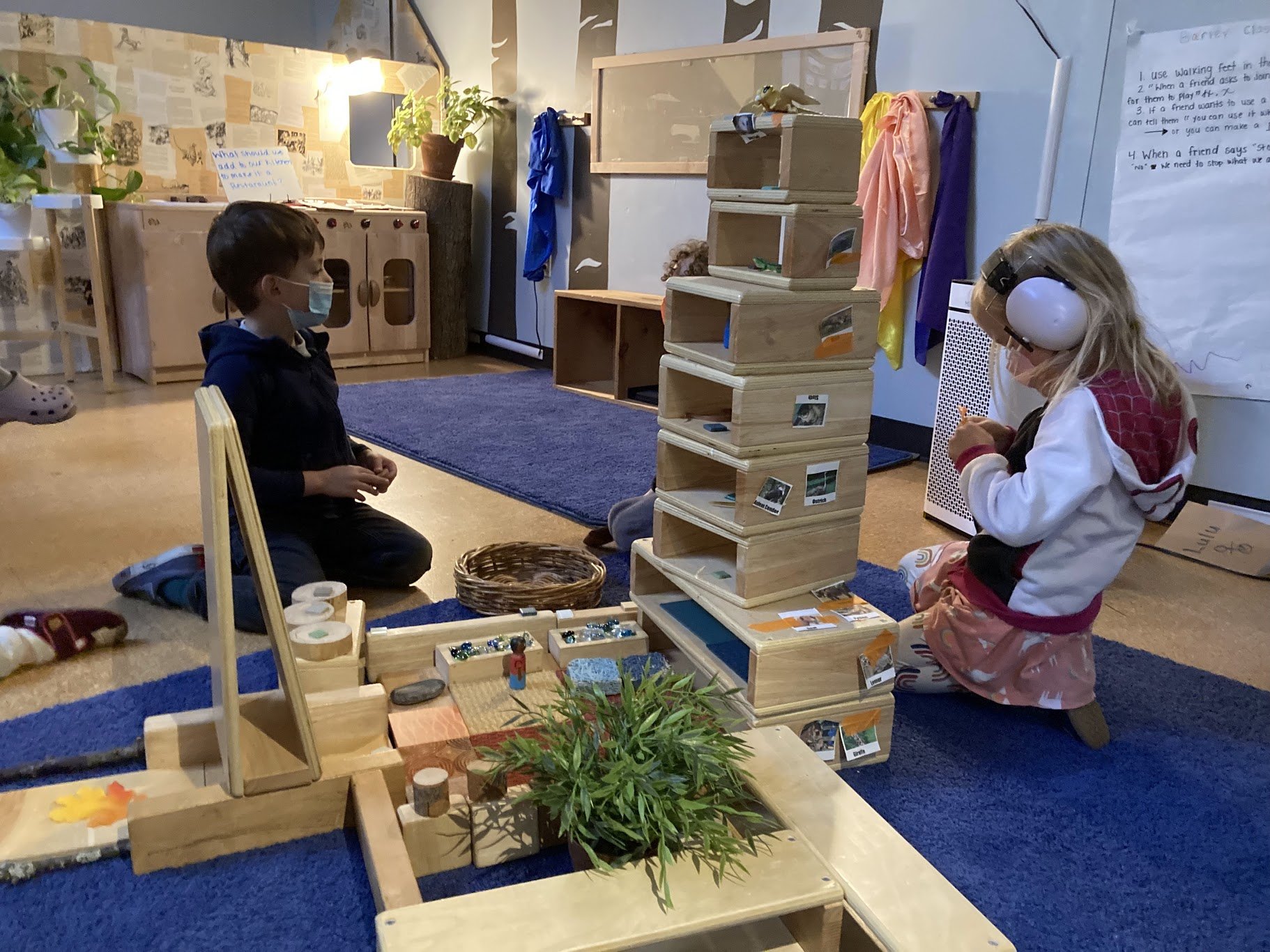Play BASED LEARNING
Maria Montessori called play “the work of the child” - meaning that play (skillfully defined by Steven Gross, Director of the Life is Good Foundation, as: “the motivation to freely and joyfully engage in, connect with, and explore the surrounding world”) is the main vehicle through which children acquire knowledge, and make sense of their physical and social worlds.
Supported by progressive early childhood research, we believe play is the most important work of the child, and the ability to exercise choice with open-ended, sensory rich materials, and to deeply investigate the things that they observe, sets the stage for all future learning and endeavors. In addition, play is the primary vehicle for testing and practicing vital skills for social emotional learning, understanding cause and effect, working with and alongside peers, and testing out difficult concepts. As educators, we gain insight into the thoughts and interests of students, which then informs how we guide, plan, reflect on and facilitate more joyful experiences and playful inquiry.
Provocations & Documentation
Our teachers are skillful observers of children. They combine their understanding of child development with their observations and the emerging interests and inquiries of children, to prepare learning environments, select materials, and create strategic activities, or provocations, that help engage and invite children to make further discoveries, generate new ideas, experiments, and hypotheses within the context of their play. Teachers carefully listen to and observe children as they play, making note of their reflections and inquiries while scaffolding their process through questions or statements that invite deeper thinking. Teachers document the child’s learning process by collecting samples of the children’s work, recording transcripts of conversations, and by capturing images and video of the children’s experiences. Reflecting and sharing with colleagues (children and families are an important part of this process) allows for a deeper understanding of how children learn, their interests, growth and development.
Process ORIENTED
Because learning takes place over time within our classrooms and surrounding environments, we focus on process, or the evolution of ideas and concepts created by exploring, experimenting, discovering cause and effect, and making natural connections. This can be illustrated in the way in which we approach art, as a child-initiated process. We provide an array of materials from media and tools designed for art making, to recycled and natural loose parts that provide for open ended exploration and expression. Children engage in individual and collaborative work, small or large scale projects, exploring through their senses while inspiring one another through their actions, thoughts and stories.
Our focus on process carries over in how we approach early literacy, math, science and engineering concepts as well. Play is the platform for interdisciplinary inquiry and project based learning. Our environment will be conversation-based, with visible documentation of student work, real-time reflection, and provocative/leading questions to enhance learning opportunities. With ample time dedicated to reading, listening and dramatically engaging with stories, children will recognize, hear, and sound out letters and words, while also building context and skills like critical thinking, problem solving, and empathy. Daily sensory explorations are tied to the concepts that emerge in class, and involve the use of varying utensils and mediums (narrow and wide paint brushes, thin and thick liquids, sprayers, bottles, tweezers, clays, magnetics etc.) that help develop the critical fine motor skills for building, creating, tinkering, and learning how to write.
Language is an intentional part of our process. We carefully consider our comments and acknowledgment of children’s efforts, thinking, and learning goals in an effort to help increase self-motivation and comfort in making mistakes as a part of a growth mindset and approach to learning. We utilize literacy materials and storytelling within the classroom, as windows to considering differences, understanding feelings and making connections with one another and the environment; and encourage reflective and dramatic play as ways for children to engage and share their learning.
Partnerships
Parent Partnerships: We value parents as the first teachers and recognize that each family brings a unique perspective to the classroom. We encourage families to support classroom learning by making connections between home and school. Young children ask many questions, and in their inquiries, in their learning how to learn, they invite us to become reciprocal partners in their process. Our regular classroom communication and shared documentation/recordings provide parents with windows into a child’s thoughts and the discoveries taking place within the classroom. This shared documentation helps connect parents to their children's learning week by week, so parents can ask questions and continue to encourage curiosity with their children at home. We also welcome authentic participation from families through cultural shares or skillful contributions of time and talent (i.e. field trip guides and enrichment opportunities, natural ecology expertise, sharing expressive arts/storytelling, photography/web assistance, devising a scholarship program, community partnership building, etc).
Community Partnerships: Operating through a Reggio lens, we consider both the classroom and the larger community environment as a “third teacher” for our students. Jamaica Plain is a vibrant, diverse community. Our school is located in the heart of a thriving small business complex and bustling artist network. Given our proximity to the open green parks and play spaces of the Southwest Corridor, we have ample opportunities to explore and be an active part of our neighborhood.
Additionally, Stony Brook School collaborates to use and help maintain the Egleston Community Orchard, a local public garden space in our neighborhood. The garden is filled with herbs, raspberry bushes, milk weed, and the worms, snails, and butterflies that live there!





